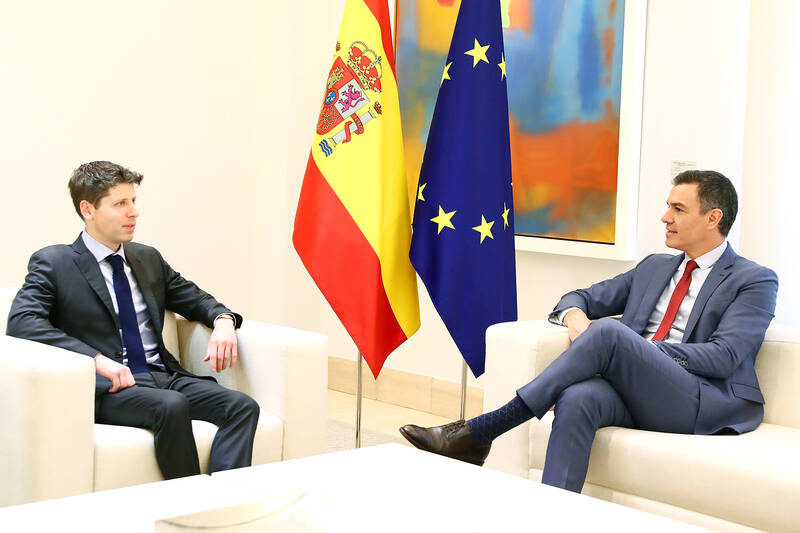ChatGPT’s creator OpenAI is testing how to gather broad input on decisions affecting its artificial intelligence (AI), its president Greg Brockman said on Monday.
At AI Forward, an event in San Francisco hosted by Goldman Sachs Group Inc and SV Angel, Brockman discussed the broad contours of how the maker of the popular chatbot is seeking regulation of AI globally.
One announcement he previewed is akin to the model of Wikipedia, which he said requires people with diverse views to coalesce and agree on the encyclopedia’s entries.

Photo: EPA-EFE / Office of Spain’s Prime Minister
“We’re not just sitting in Silicon Valley thinking we can write these rules for everyone,” he said of AI policy. “We’re starting to think about democratic decisionmaking.”
Another idea that Brockman discussed, on which OpenAI elaborated in a blog post on Monday, is that governments around the world should coordinate to ensure AI is developed safely.
Since the Nov. 30 launch of ChatGPT, generative AI technology that can spin uncannily authoritative prose from text prompts has captivated the public, making the program the fastest growing app of all time. AI has also become a focus of concern over its ability to create deepfake pictures and other misinformation.
In assessing the path forward for AI, Brockman looked at Wikipedia as well as elsewhere.
He and OpenAI said a body like the International Atomic Energy Agency could place restrictions on deployment, vet compliance with safety standards and track usage of computing power.
Another suggestion was a global agreement to limit the annual growth of frontier AI capabilities, or a joint global project that major governments could participate in.
OpenAI CEO Sam Altman last week proposed various ideas to US lawmakers for setting guardrails for artificial intelligence, among them requiring licenses to develop the most sophisticated AI models and establishing a related governance regime.
He is visiting European policymakers this week.

Intel Corp chief executive officer Lip-Bu Tan (陳立武) is expected to meet with Taiwanese suppliers next month in conjunction with the opening of the Computex Taipei trade show, supply chain sources said on Monday. The visit, the first for Tan to Taiwan since assuming his new post last month, would be aimed at enhancing Intel’s ties with suppliers in Taiwan as he attempts to help turn around the struggling US chipmaker, the sources said. Tan is to hold a banquet to celebrate Intel’s 40-year presence in Taiwan before Computex opens on May 20 and invite dozens of Taiwanese suppliers to exchange views

Application-specific integrated circuit designer Faraday Technology Corp (智原) yesterday said that although revenue this quarter would decline 30 percent from last quarter, it retained its full-year forecast of revenue growth of 100 percent. The company attributed the quarterly drop to a slowdown in customers’ production of chips using Faraday’s advanced packaging technology. The company is still confident about its revenue growth this year, given its strong “design-win” — or the projects it won to help customers design their chips, Faraday president Steve Wang (王國雍) told an online earnings conference. “The design-win this year is better than we expected. We believe we will win

Chizuko Kimura has become the first female sushi chef in the world to win a Michelin star, fulfilling a promise she made to her dying husband to continue his legacy. The 54-year-old Japanese chef regained the Michelin star her late husband, Shunei Kimura, won three years ago for their Sushi Shunei restaurant in Paris. For Shunei Kimura, the star was a dream come true. However, the joy was short-lived. He died from cancer just three months later in June 2022. He was 65. The following year, the restaurant in the heart of Montmartre lost its star rating. Chizuko Kimura insisted that the new star is still down

While China’s leaders use their economic and political might to fight US President Donald Trump’s trade war “to the end,” its army of social media soldiers are embarking on a more humorous campaign online. Trump’s tariff blitz has seen Washington and Beijing impose eye-watering duties on imports from the other, fanning a standoff between the economic superpowers that has sparked global recession fears and sent markets into a tailspin. Trump says his policy is a response to years of being “ripped off” by other countries and aims to bring manufacturing to the US, forcing companies to employ US workers. However, China’s online warriors